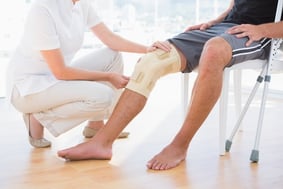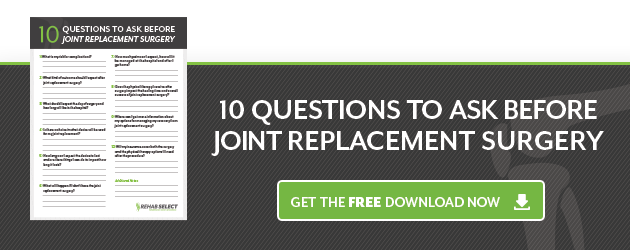 If you are having knee replacement surgery in the near future, you have probably already been told that effective follow-up care is essential to a great outcome. In fact, the care and therapy you receive after surgery can be just as important to a successful outcome as the procedure itself. So how does the average patient go about picking the right follow-up care after knee replacement surgery?
If you are having knee replacement surgery in the near future, you have probably already been told that effective follow-up care is essential to a great outcome. In fact, the care and therapy you receive after surgery can be just as important to a successful outcome as the procedure itself. So how does the average patient go about picking the right follow-up care after knee replacement surgery?
What Follow-Up Care Does a Knee Replacement Patient Need?
Every patient is different, so needs for follow-up care will vary. However, there are general after-care guidelines that will apply to most patients. Among these is a need for wound care, including dressing changes and monitoring of the wound for signs of infection. Most patients will have medications to take as part of follow-up care, which may include blood thinners, pain medication and antibiotics, among others. Follow-up visits with your surgeon and other health care providers will be necessary as you recover. Rehabilitative therapy is recommended for most patients for post-surgery rehabilitation of the affected knee, including physical therapy, occupational therapy and joint education, as is regular daily exercise outside of therapy sessions.
Picking the Best Options for Your Follow-Up Care
As you weigh your options for follow-up care after knee replacement surgery, it is very important not to underestimate the impact that this surgery will have on how you feel and function during the first few days and weeks of your recovery. Having a joint replaced is serious surgery, and you will experience pain, discomfort, stiffness, and fatigue during this period as your body recovers from the shock of the surgical procedure.
Many patients find juggling the details of follow-up care during this period very difficult – managing new medications, keeping track of appointments and arranging transportation back and forth to daily outpatient rehabilitative therapy sessions, for instance – even if they are meticulously planned well in advance. For this reason many patients find that a short term rehab program is the best way to go, and most surgeons recommend them as a means of ensuring optimal recovery and rehabilitation. Using an inpatient program during this very intense early phase of your recovery can place many of the everyday details and hassles of managing your care in the hands of health and rehabilitative professionals, leaving you free to focus on the important stuff – the hard work of recovering from surgery and getting your new knee in shape so you can get back to your life.
Should you opt for inpatient short term rehab for your follow-up care, be sure to ask your health care team for a list of recommendations as to good programs in your area. Look into those options to find a short term rehab program with lots of experience treating knee replacement patients, a reputation for top-notch care and a track record of great rehabilitation results. That will mean doing a little legwork, since visiting these programs is the best way to find out about those details. Once you find one you're pleased with, make arrangements for your treatment ahead of time to ensure all goes smoothly after your procedure.





